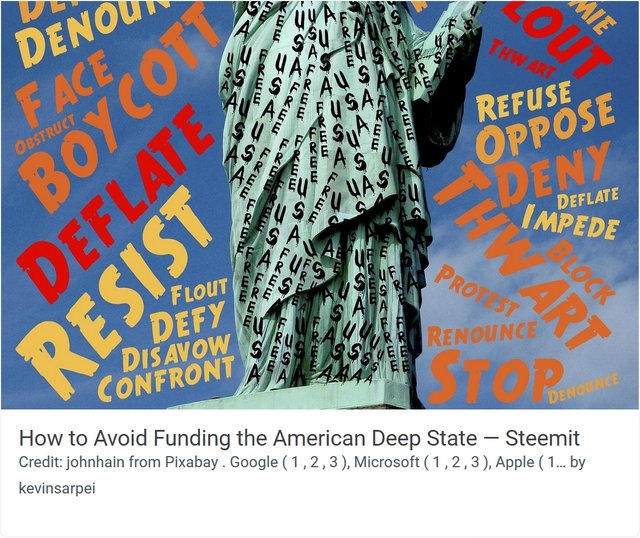How to Get Rid of the American Deep State

'[T]he term "deep state" does not refer to a conspiracy theory about a shadowy cabal of baby-sacrificing Illuminati, but to a concept in political analysis which accounts for the self-evident fact that there are unelected power structures in America which tend to collaborate with one another. It is not up for debate whether or not groups like the billionaire class, multinational corporations and banks, the intelligence community, the military-industrial complex, and the corporate media exist. They do. They exist, they have power, they are unelected, they remain amid the comings and goings of the elected government, and they are known to collaborate in various ways toward their own agendas. This is an undeniable fact; you cannot debate the existence of the American deep state, but only how and to what extent it operates.' - Caitlin Johnstone
As sensationalist as it may sound, in this article, I will explain why I think it's safe to say the American deep state has been the biggest obstacle to world peace for decades. However, as the title suggests, I will also explain why I think its extent doesn't go beyond our ability to get rid of it.
First of all, as SIPRI points out in its 2018 report "Trends in world military spending, 2017," the U.S. spends more on military expenses than the next seven highest-spending countries combined.

In fact, almost half of the 2017 U.S. discretionary budget went towards military spending.
No, I don't think Russia or China would start a nuclear war if the U.S. reduced its military budget to fix its domestic problems:

I also don't think it was worthwhile that the U.S. spent virtually $250 million a day on the War on Terror from 2001 to 2017. Here are a few reasons why:
- In 2001, worldwide, there were 355 terror attacks. In 2014, there were 13,500, which I suppose could have something to do with the fact that "Nearly 90 Percent Of People Killed In Recent Drone Strikes Were Not The Target."

The War on Terror has so far killed thousands of U.S. soldiers and hundreds of thousands of Middle Eastern civilians.

To be clear: yes, there are more-effective things the government could do against terrorism. For example:
It could stop terrorizing people into becoming terrorists.
It could stop approving arms sales to countries that support terrorist groups.
It could stop directly supporting and creating terrorists.

So, since the "War on Terror" is clearly not only not working but actually making things worse, it begs the question: why is it still going on?
Could it maybe have something to do with the fact that it keeps the money flowing to, for example, the military-industrial complex? After all, the U.S. government, like other governments, has a well-documented history of making false claims to "justify" military interventions.

Even Democratic Senator Elizabeth Warren voted to increase Donald Trump's 2018 military budget by $80 billion. And she's not the only "anti-establishment progressive" with a pro-establishment record:

The deep state being the de-facto government would explain why Trump, Barack Obama, and George W. Bush ran as non-interventionists only to then militarily intervene all the time. It would also explain all of this:

Credit: PremierCompanies from Pixabay, Somchai Kongkamsri from Pexels.










Now, getting rid of the deep state is not just about, say, ending and preventing wars. It's also about preventing it from basically checkmating the entire world:
From Caitlin Johnstone's article "Seize The Means Of Automation":
"The coming advancements in AI will not happen linearly— that is to say, advancements in software tend to be exponential, as in Moore's law that the numbers of transistors we can fit onto a silicon chip doubles every two years. This means that it is not reasonable for us to expect that in ten years’ time AI developments will have advanced the same amount that they did in the last ten years; a much more reasonable expectation is that the evolution of AI will have covered many times more ground in the next ten years than in the last ten."
"Because of these likely non-linear developments it is difficult to imagine what the job market will look like in the next decade, but some have speculated. Research firm PwC estimates that nearly forty percent of US jobs will have been lost to robotics alone in the next fifteen years. Kai-Fu Lee, a respected Chinese tech leader, says AI advancements will lead to fifty percent of all jobs being lost to automation in the next decade. An Oxford University study more or less agrees."
"At that point we’d be in a world out of Orwell’s nightmares. There’d be no way of checking the power of the plutocrats, and they’d no longer have to play nice and remain hidden to maintain the illusion of freedom and democracy like they do now. We’d be at their mercy, and given the evils that the billionaire class is already inflicting upon the world there’s no reason to expect that to end well for us. There’d be absolutely nothing stopping the ruling class from doing whatever they like to us, and indeed nothing forcing them to keep us around at all."
So, I suggest we get rid of the deep state, and then maybe let non-sentient, non-dangerous machines work for us so that everyone has a guaranteed basic income, as explained here in this excerpt from Johnstone's article:
"Right now, though, there is a closing window of opportunity to nip this one in the bud. If people can successfully take their political power away from the plutocrats, they can create a society in which automation and artificial intelligence are democratically controlled public assets. Everyone becomes a part owner of these technologies, gets a share of the profits they generate, and gets a unit of control over where they’re headed."
1. We can fight the deep state by avoiding funding it.
"Google (1, 2, 3), Microsoft (1, 2, 3), Apple (1, 2, 3), Amazon (1, 2, 3), Mozilla (1, 2, 3), Facebook (1, 2, 3), Twitter (1, 2, 3), Yahoo! (1, 2, 3), eBay (1, 2, 3), reddit (1, 2, 3), Medium (1, 2, 3), and other big businesses have made it pretty clear that they're with the deep state. Fortunately, as addicted as these assholes may have gotten us to their shit, as easy it is to get clean, especially when you take your time."

2. We can fight the deep state by not supporting politicians or candidates who go along with its war propaganda.
Update
Debbie Lusignan's video was deleted (along with her channel), so here are three quotes from her instead:
"I'm looking in the mirror, and I am absolutely appalled that I rationalized that somebody who has been so aligned with the military-industrial complex was an acceptable choice for me to support in a primary. And I had good intentions. The road to hell is paved with good intentions. It was: could we have some kind of compromise, you know, can't let the perfect be the enemy of the good. But there are certain things that we cannot compromise on."
"We have to address the premise of war as a business model as being foundational to what our movement is gonna have to be about. Even if you're just narcissistic about it, and you really don't care about the manufacturing of refugees, and you really don't care about the death, and the destruction, and the sex trafficking, and the organ harvesting, and all of the ugly things that are being manifested in our name that we stay silent on [...]. [W]e are not going to be successful in changing our own country domestically when so much of our money is siphoned off and funneled out into a pit to support war."
"It's gotten so corrupted, compromise doesn't mean compromise anymore. Compromise means wholesale sell out. And so we don't have any lines what we hold politicians to account for. None. Every time they cross a line that should be too dear to cross, every time that they betray us, we rationalize that we have to stay with them [...]. Until we as a people get some kinda ethic and integrity and understanding of how you hold political structures to [account] - which does not include celebrity worship of politicians, I'll tell you that much - we're gonna be lost."
3. We can fight the deep state by getting truly anti-establishment candidates elected.
That is, if we first get rid of electronic voting machines.
Since elections are a state issue, and every state has some form of direct democracy, I opened a Minds group for each one, in which we can organize to get rid of electronic voting machines:
Alabama, Alaska, Arizona, Arkansas, California, Colorado, Connecticut, Delaware, Florida, Georgia, Hawaii, Idaho, Illinois, Indiana, Iowa, Kansas, Kentucky, Louisiana, Maine, Maryland, Massachusetts, Michigan, Minnesota, Mississippi, Missouri, Montana, Nebraska, Nevada, New Hampshire, New Jersey, New Mexico, New York, North Carolina, North Dakota, Ohio, Oklahoma, Oregon, Pennsylvania, Rhode Island, South Carolina, South Dakota, Tennessee, Texas, Utah, Vermont, Virginia, Washington, West Virginia, Wisconsin, Wyoming.
'Kevin, you're naive if you genuinely believe that we can not only get rid of electronic voting machines but also get enough people to vote for "truly anti-establishment candidates," when independent and third-party candidates can't really make it into the televised debates.' - Negative Nancy
While there may be at least some truth to Nancy's comment, I obviously don't agree with it. For starters, literally everyone knows that computers can be hacked - it's not a left-versus-right issue. So I highly doubt more than three people would vote against getting rid of electronic voting machines (imagine the reaction if the establishment tried to rig the vote anyway).
2. By "truly anti-establishment candidates," I basically mean candidates who always tell it like it is, so including when it comes to things like 9/11.






"I'm constantly annoyed that people are distracted by false conspiracies such as 9/11, when all around we provide evidence of real conspiracies, for war or mass financial fraud." - Julian Assange
"I hate that 9/11 crap." - Tucker Carlson
"[That the towers collapsed due to planned demolitions, and that a proper investigation did not take place afterwards] is a lousy conspiracy theory." - Ben Shapiro
"Run-In with Annoying 9/11 Truther," by The David Pakman Show.
3. People can't be scared into voting for a lesser-evil candidate when there's ranked-choice voting.
4. Thanks to this won lawsuit, independent and third-party candidates might actually make it into the next presidential debates. Of course, local elections matter too.
Even if the media and the Commission on Presidential Debates find a way to exclude independent and third-party candidates from the televised debates for the foreseeable future: we now have the internet and social media. Not to mention, according to this Gallup poll, 42 percent of Americans already identify as independents.
Update
I've been wrongfully banned from Minds. At the moment, my groups are still up, but I can obviously no longer manage them. They barely had any members to begin with though. So I think it would take someone who has more than twelve followers to get an effort like this going. Or maybe it has to be done offline, through local meetings or something.





Source
Copying and pasting previous posts could be seen as spam when:
If you believe this comment is in error, please contact us in #disputes on Discord
Also:

Your posts are exceptional - it can be hard to get started on Steemit, but medium length quality posts can quickly get you an audience - and there are some solid voters on Steemit who would really appreciate your content.
Thanks! I actually posted a few excerpts from my article about boycotting the deep state, and the shortest one did do the best.
Hi! I am a robot. I just upvoted you! Readers might be interested in similar content by the same author:
https://steemit.com/politics/@kevinsarpei/how-to-get-rid-of-the-american-deep-state
(The article is basically an updated version of this article, which I published in June.)